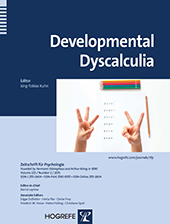“Bayesian Statistics”
A Topical Issue of the Zeitschrift für Psychologie
Statistical inference is a critically important tool across the sciences, and in particular in psychological science. A tremendous amount of psychological science is built upon statistical analysis of experimental or observational data, or on statistical modeling. From the basic analysis of simple one- and two-sample designs to sophisticated hierarchical models of cognition, one fundamental question arises: How can we learn from the data? Debates over various approaches to answering this question have occurred throughout the history of psychological science, and continue to this day.
Bayesian statistics refers to a broad collection of methods whose commonality is the use of Bayes’ theorem to draw inferences. For most of the 20th century, Bayesian statistics had little impact on statistical practice in the psychological sciences, which were primarily dominated by an ad hoc blend of Fisherian and Neyman-Pearson approaches to statistical inference. As psychological methodologists become increasingly disenchanted with the statistical status quo, Bayesian statistics offer a viable way forward for psychological science. New tools developed in the past decade have brought Bayesian statistics within the grasp of psychological researchers.
As Bayesian statistics become part of standard analysis in psychology, the Zeitschrift für Psychologie invites papers to a topical issue highlighting Bayesian methods. We invite papers on a broad range of topics, including the benefits and limitations of Bayesian approaches to statistical inference, practical benefits of Bayesian methodologies, interesting applications of Bayesian statistics in psychology, and papers related to statistical education of psychologists from a Bayesian perspective. In addition to suggestions for full original or review articles, shorter research notes and opinion papers are also welcome.
We invite scholars from various areas of scholarship, including but not limited to psychology, statistics, philosophy, and mathematics, to submit their abstracts on potential papers.
How to submit: Interested authors should submit a letter of intent including: (1) a working title for the manuscript, (2) names, affiliations, and contact information for all authors, and (3) an abstract of no more than 500 words detailing the content of the proposed manuscript electronically to the guest editor, Richard D. Morey (mailto: richarddmorey@gmail.
There is a two-stage submission process. Initially, interested authors are requested to submit only abstracts of their proposed papers. Authors of the selected abstracts will then be invited to submit full papers. All papers will undergo blind peer review.
- Deadline for submission of abstracts is July 30, 2015.
Selection of abstracts for invitations to submit full papers will be made by August 15, 2015.
- Deadline for submission of full papers is November 30, 2015.
The journal seeks to maintain a short turnaround time, with the final version of the accepted papers being due by February 15, 2016. The topical issue will be published as issue 3 (2016).
For additional information, please contact the guest editor.
About the Journal
The Zeitschrift für Psychologie, founded in 1890, is the oldest psychology journal in Europe and the second oldest in the world. One of the founding editors was Hermann Ebbinghaus. Since 2007 it is published in English and devoted to publishing topical issues that provide state-of-the-art reviews of current research in psychology.
For detailed author guidelines, please see the journal’s website at www.hogrefe.com/journals/zfp/



